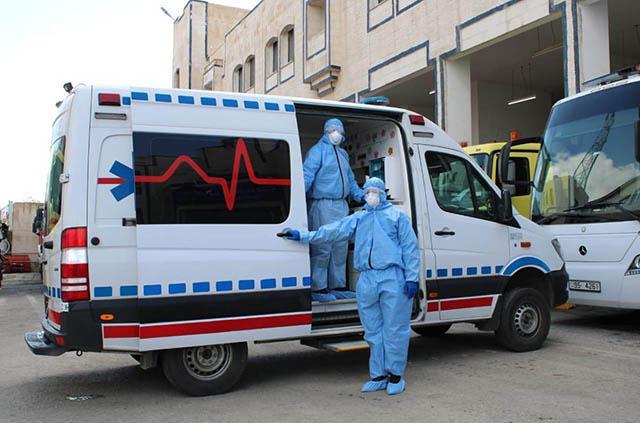You are here
Jordan needs ‘better application’ of occupational safety, health standards at workplace
By Ana V. Ibáñez Prieto - Apr 29,2018 - Last updated at Apr 29,2018
AMMAN — Jordan is in a dire need of promoting the application of occupational safety and health standards set forth in the national legislation and international standards, a position paper by the Jordan Labour Watch (JLW) said.
Issued in cooperation with the Friedrich Ebert Foundation (FES), the paper called for further efforts in the coordination between the Ministry of Labour, the Social Security Corporation (SSC), the Civil Defence Directorate and the Ministry of Health, in addition to the activation of inspections carried out by official bodies on business establishments.
The statement came on the occasion of the World Day for Safety and Health at Work (SafeDay), marked annually by the International Labour Organisation (ILO) on April 28 to raise awareness on occupational safety and health among trade unions, employers and government representatives.
This year, SafeDay and the World Day Against Child Labour came together in a joint campaign aimed at improving the safety and health of young workers and put an end to child labour, according to the ILO’s official website.
The campaign seeks to accelerate action to achieve the Sustainable Development Goal (SDG) 8.8 for "safe and secure working environments for all workers by 2030", and SDG 8.7 to "end all forms of child labour by 2025".
The paper, titled "Occupational Safety and Health in Jordan", conceded that “there is a good harmony between the Jordanian legislation and the relevant international standards on occupational health and safety, especially those contained in the ILO conventions on Social Security and Public Health”.
It emphasised nonetheless the need to ratify the ILO conventions on occupational safety and health, occupational health services and chemical safety, stressing that “this would raise the Jordanian standards in labour”.
“The Ministry of Labour is concerned with the provision of a sound and risk-free work environment under the royal directives of His Majesty King Abdullah II," Labour Ministry Spokesperson Mohammad Al Khatib told The Jordan Times, pointing out that “in the past years, the ministry has promoted a culture of awareness among employers and workers alike in partnership with the relevant authorities in order to reduce work related injuries”.
Khatib referred to the preparation of the national strategy for occupational safety and health and the conduction of studies aimed at amending the current legislation towards a unified system benefiting all parties, in addition to the establishment of training centres.
The paper criticised the “fluctuations” in the level of application of occupational health and safety standards in business establishments, explaining that “although the adherence is high in most large companies, medium and small enterprises tend to apply the regulations in a lax manner”.
JLW also criticised the “lack of comprehensive and accurate statistical databases on occupational accidents, injuries and diseases that take place in Jordan, with the exception of the statistics issued by the SSC”.
According to the latest figures available at the SSC, the number of occupational accidents and injuries in the year 2016 reached 13,345, recording a decline compared to 2015, when the number stood at 14,556.
“However, the indicators provided by the SSC do not reflect the reality that takes place on the ground,” the paper noted, stressing that “it is worth noting that a significant number of work accidents and injuries occur among workers in the informal economy and are not registered which the SCC, which account for 50 per cent of the Jordanian workforce”.
“Moreover, many organisations do not report all incidents in order to avoid being subjected to increased cuts regarding occupational safety and health,” the paper added.
“The minimum we need in order to prevent occupational accidents and injuries is the employers’ commitment to the legislation,” Khatib said, noting that “the enterprises hold the moral and legal responsibility to identify all the hazardous factors that may affect their workers, and to take the necessary measures to control them and reduce the risks”.
The official pointed to the workers’ responsibility in maintaining their safety and that of their colleagues by following proper work procedures, alerting those responsible for any circumstance or activity that may lead to accidents.
“It is necessary to join efforts along with the concerned official bodies and stakeholders in order to build a culture of occupational safety across the Kingdom,” Khatib concluded, expressing hopes to reach a “zero accidents working environment” in Jordan.
Related Articles
AMMAN — A position paper issued by the Jordan Labour Watch (JLW) on Tuesday, showed that there are still many gaps in occupational health an
AMMAN – The Jordan Labour Watch (JLW) on Monday issued a paper that highlights the importance of boosting protection of healthcare workers s
AMMAN — One work injury occurred every 34 minutes in Jordan in 2014 and one work-related death was registered every three days, the Social S

















